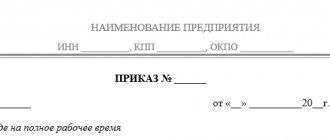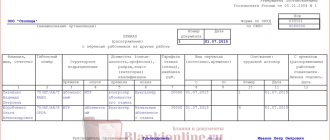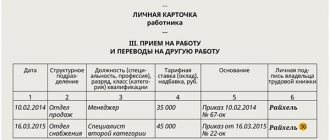Working remotely - registration according to the Labor Code of the Russian Federation
Remote (remote) work gives an employee the opportunity to carry out his work without being tied to a specific workplace, although in all other respects he, just like an ordinary employee, is subject to the requirements of labor legislation (Article 312.1 of the Labor Code of the Russian Federation). The special nature of the work determines a number of features of this work (Chapter 49.1 of the Labor Code of the Russian Federation):
- it does not require the permanent presence of the employee in the territory under the control of the employer, and allows the employee to independently establish a work and rest regime acceptable to him, unless otherwise provided in the employment contract;
- the list of employer responsibilities in terms of labor protection is narrowed down to a few issues (sanitary services, medical care, compulsory social insurance against accidents, familiarization of the employee with labor protection requirements);
- work can be performed using labor tools (equipment, computer programs) recommended by the employer and owned either by the employee or the employer;
- the transfer of work results can occur via electronic means of communication;
- to carry out electronic interaction, it is possible to issue an enhanced qualified electronic signature for the employee, allowing him to generate legally significant electronic documents;
- all special conditions related to ensuring the labor process, labor protection, provision of vacations, dismissal are stipulated in the employment agreement.
Due to the unfavorable epidemiological situation associated with the spread of coronavirus, many employees have been temporarily transferred to remote work. ConsultantPlus experts explained the procedure for filling out an order for remote work. If you do not yet have access to the K+ system, get a trial demo access and move on to the Ready Solution for free.
The transition to remote work is carried out by mutual agreement between the employee and the employer and can be either temporary or permanent. Moreover, the employee can be immediately hired for such a job, or he can be transferred to it after receiving the appropriate application from the employee. However, in any case, it will be necessary to reflect the fact of such work in the employment contract (if the employee is immediately hired for such work) or in an additional agreement to it (if a transfer occurs).
Note! The employer has the right to transfer employees to remote work without their consent in emergency cases, including during epidemics. This provision was introduced into the Labor Code by Law dated December 8, 2020 No. 407-FZ. Read about other innovations here.
The conclusion of an agreement on remote work can be carried out by electronic correspondence, but it must be immediately followed by the exchange of paper copies of the agreement (additional agreement) via regular mail. But the procedure for familiarizing an employee with an order for admission (transfer) to remote work is sufficient to complete through electronic exchange of documents (Article 68, 312.2 of the Labor Code of the Russian Federation).
You can find a sample employment contract with a remote worker here.
By agreement between the employee and the employer, it is permissible not to include information about the period of remote work in the work book. Work experience in this case will confirm the employment contract with records indicating the nature of the work.
But if you need to make an entry in the work book of a remote worker, get free access to ConsultantPlus, go to the HR Guide and see the experts’ explanations and a sample.
Read about the meaning and procedure for determining length of service in the article “Total length of service - what is included and how to calculate.”
Who can be transferred to remote work?
Representatives of not all professions can be “removed.”
But the global “exodus from the office” has already begun in engineering, sales, finance, design, journalism, programming, additional education, logistics management and other areas. If 3/4 of an employee’s functionality does not require his physical presence, you can think about new work formats. Transferring employees to remote work must be done rationally and legally.
First of all, it is necessary to distinguish between three situations:
- Freelancing (a specialist freely offers his services to many customers on the market). As a rule, it is not formalized in an employment contract. One-time services are provided. You can use the formats of a civil contract (CLC), individual entrepreneur or self-employment.
- A completely remote employee who initially does not undertake any obligation to be on the employer’s premises (their work is regulated by Article 312 of the Labor Code of the Russian Federation).
- Temporary or partial transfer of previously hired employees to remote work.
Temporary transfers are not yet regulated by law, which creates the ground for mutual distrust between the employee and the employer. But in light of current events in March 2021, deputies accelerated the consideration of amendments to the Labor Code. It is planned to introduce the concepts of “part-time remote employment mode” and “temporary remote work”. Of course, the time has come for such options!
In the first case, a flexible combination of “full-time” and “correspondence” employment is meant in a format that suits the employee and the employer. Let's say a specialist valuable to the company moves to live in the suburbs. It can be set to 4 days remote + 1 day in the office (or any other option that suits both sides of the labor relationship).
In the second case, a temporary transfer of employees to remote work is provided if any circumstances require it (from an epidemic to painting the walls).
Until changes have been made to the labor code, the employer can rely on the provisions of Article 312, and additionally take into account the Recommendations of Rostrud in the form of questions and answers dated March 23, 2020 as a precedent in the preparation of legislative reinforcement of the norms https://rosmintrud.ru.
Is the employee's consent required to transfer to remote work?
Of course, the transition to remote work is possible only with the voluntary informed consent of the employee:
- If an employment contract is initially concluded with an employee on the basis of Article 312 of the Labor Code of the Russian Federation, then it states that labor functions will be performed remotely, that is, outside the location of the company, and interaction with the employer will be carried out via telecommunication networks. Read more about hiring remote workers in this article.
- If an employee is transferred to remote work temporarily or partially, a written statement about this is required.
Forcing a person officially hired for “full-time” work to change the place where he performs his labor function is fraught. This may be interpreted as a deterioration in the terms of the employment contract. In case of employee complaints, the court and labor inspectorate will side with the employee.
You might be interested in:
Certificate of employment: in what case is it issued, for what purposes, sample filling, can the employer refuse
Also, it is impossible to reduce the remuneration of an employee remotely compared to what is written in the TD and/or regulations on remuneration.
How to issue an order for transfer to remote work
Transfer to remote work can occur in two ways:
- When only the nature of the connection to the location of the employer changes, and all other parameters of the job (position, qualification indicators, level of remuneration, connection to the structural unit) remain the same as before the transfer.
- When a change in the nature of the connection to the location of the employer coincides with a transfer:
- to another structural unit;
- to another position or to another qualification category;
- to a different salary or tariff rate.
For option 1, it will be sufficient to create a single free-form order containing:
- an indication of the essence of the change being made;
- the effective date of this change;
- a list of documents that served as the basis for issuing the order.
A sample of such an order can be seen on our website.
With option 2, you can go in two ways:
- Two orders with the same date:
- on the transfer of an employee to another job using the unified form T-5;
- on transfer to remote work in any form;
- One order on a form based on the unified T-5 form, but modified by adding a field reserved for indicating the nature of the connection to the location of the employer.
Read more about the T-5 form in the material.
You can learn about the nuances of taxation of payments to remote workers from the Ready-made solution from ConsultantPlus, having received free trial access to the system.
Do employees have to write a statement?
The initiator of the transfer to remote work is either the employee or the organization; in addition, there may be a requirement from government bodies to transfer part of the workforce to remote work.
If the transfer is at the initiative of the employer
Such an initiative comes from an employer when he wants to save on rent (for example). To complete such a transfer, an application is not required, but consent to remote work is required, as is the case for any change in the terms of the employment contract determined by the parties.
Translation at the request of the employee
A person wants to work outside the office, for example, because he likes to spend the winter in Bali. There are domestic circumstances that force an employee to ask the manager to switch to remote work: the illness of close relatives, the presence of small children, etc. He puts the request in writing, the company meets halfway or refuses.
It is not technically possible to transfer every employee to remote work. For example, a storekeeper will remain working in a warehouse even if he wants to, but it’s easy to give an accountant or logistics manager the opportunity to work remotely.
The employer is not obliged to transfer anyone to remote work unless there is an order from the authorities, therefore it has the right to refuse any employee. In the event of a relative’s illness, confirmed by documents, according to Article 93 of the Labor Code, the organization is obliged to meet halfway and establish part-time working hours for the employee; There is no such rule regarding remote work.
Translation required by authorities
In 2021, the topic of remote work has become especially relevant due to coronavirus. Currently, the regional authorities of Moscow and St. Petersburg have issued decrees obliging enterprises to transfer workers over 65, employees suffering from chronic diseases, and an additional 30% of the total number of employees to remote work.
Amendments to the Labor Code are planned for 2021, which will bring certainty to the issues of formalizing labor relations with a remote worker. For now, everything is happening somewhat spontaneously. We are trying to clarify, based on current legislation.
If an employee himself wants to switch to remote work due to the risk of infection, an application from him is required. If the organization decides to transfer a person, fulfilling the requirements of government agencies, an order for transfer to remote work and an additional agreement to the employment contract are drawn up.
Attention! If the employee signs these documents, then everything is in order. If he refuses to switch to remote work, he cannot be forcibly transferred. The authorities’ requirement will have to be fulfilled in another way - by taking out “quarantine” sick leave, vacation or downtime.
Results
Current legislation allows for the possibility of working remotely (without being tied to jobs created by the employer). Such work is subject to the requirements of the Labor Code of the Russian Federation, but has a number of features due to the remote nature of the work. Transfer to remote work is carried out by agreement between the employee and the employer by reflecting the terms of the agreement reached in the employment contract or an additional agreement to it. An order to transfer to remote work is issued in any form.
Sources: Labor Code of the Russian Federation
You can find more complete information on the topic in ConsultantPlus. Free trial access to the system for 2 days.
Who cannot be transferred to remote work
The construction of labor relations is based on the mutual consent of the parties (Article 15 of the Labor Code of the Russian Federation). Transfer to remote work, including temporary work, based only on the desire of the employer without taking into account the conditions specified in Art. 312.9 of the Labor Code of the Russian Federation, and the local administrative act is prohibited.
This is due to the fact that when moving to a remote format, the employee changes the place of his labor function, which is one of the essential conditions that are included in the employment contract for remote work, as established by Art. 57 Labor Code of the Russian Federation.
Changes to essential conditions are allowed only by agreement of the parties in writing (Article 72 of the Labor Code of the Russian Federation) with a warning of at least 2 months (Article 74 of the Labor Code of the Russian Federation). Force majeure circumstances are not a reason for violating the established algorithm.
IMPORTANT! Employees who object to such conditions are not subject to transfer to remote access.
The employer, on his own initiative (Article 312.9 of the Labor Code of the Russian Federation), will not transfer to remote work:
- those whose work characteristics do not allow them to perform their duties remotely, for example, a cook;
- those for whom he does not provide technical and other conditions for performing the functionality (Article 312.9 of the Labor Code of the Russian Federation).
Providing the employee with the necessary equipment and programs
The new Article 312.6 of the Labor Code of the Russian Federation established the rule according to which the employer is obliged to provide the remote worker with the necessary equipment, programs, information security tools, etc. It does not matter whether this obligation is enshrined in the labor (collective) agreement or not.
Instead of working on the employer's equipment, employees will be able to use their own tools and programs, but only with the consent of the employer. In this case, the employer is obliged to pay compensation for the use and reimburse the costs associated with this use. The amount of compensation and reimbursable expenses is determined in the collective agreement, labor agreement, employment contract or additional agreement to it.
The current norms establish that the provision of means of labor is carried out only in the manner and within the terms specified in the employment contract, this makes it possible not to establish such conditions.
A remote worker who is sent by the employer to work in another location will be subject to Articles 166-168 of the Labor Code of the Russian Federation. Such a trip will be considered a business trip, and the employee must be provided with appropriate guarantees and compensation. Currently, this aspect of the work of a remote employee is not specified in the law. However, there is still no answer to the question of whether a remote worker’s trip to the employer’s office is a business trip or not.
Working hours and rest hours for a remote worker
The working hours of a remote worker can be set at his own discretion, unless otherwise provided by a collective agreement, a local regulatory act adopted taking into account the opinion of the elected body of the primary trade union organization, an employment contract, or an additional agreement to the employment contract.
Important: if you want to control an employee’s working hours, it is necessary to determine it by the employer’s local regulations, an employment contract, or an additional agreement to the employment contract.
Courses for personnel officers. Online trainingAdvanced training, professional retraining at Kontur.School. Certificates and diplomas View programs
If an employee is temporarily transferred to remote work, you can provide for the occasional possibility of calling him to a stationary workplace, including on his initiative. Do not forget that there are exceptions to this situation, which are named in Art. 312.9 Labor Code of the Russian Federation.
The conditions and procedure for calling an employee can be established by a collective agreement, a local regulatory act adopted taking into account the opinion of the elected body of the primary trade union organization, an employment contract, or an additional agreement to the employment contract.
Important: by additional agreement to the employment contract or employment contract, provide for the territory in which the employee performs the labor function. This will eliminate additional questions when arranging a business trip for a remote worker or when making a decision to call an employee to a stationary workplace.
If you send a remote worker to carry out an official assignment to another location other than the one you indicated in the employment contract or additional agreement, you are required to register this as a business trip (Part 3 of Article 312.6 of the Labor Code of the Russian Federation).






